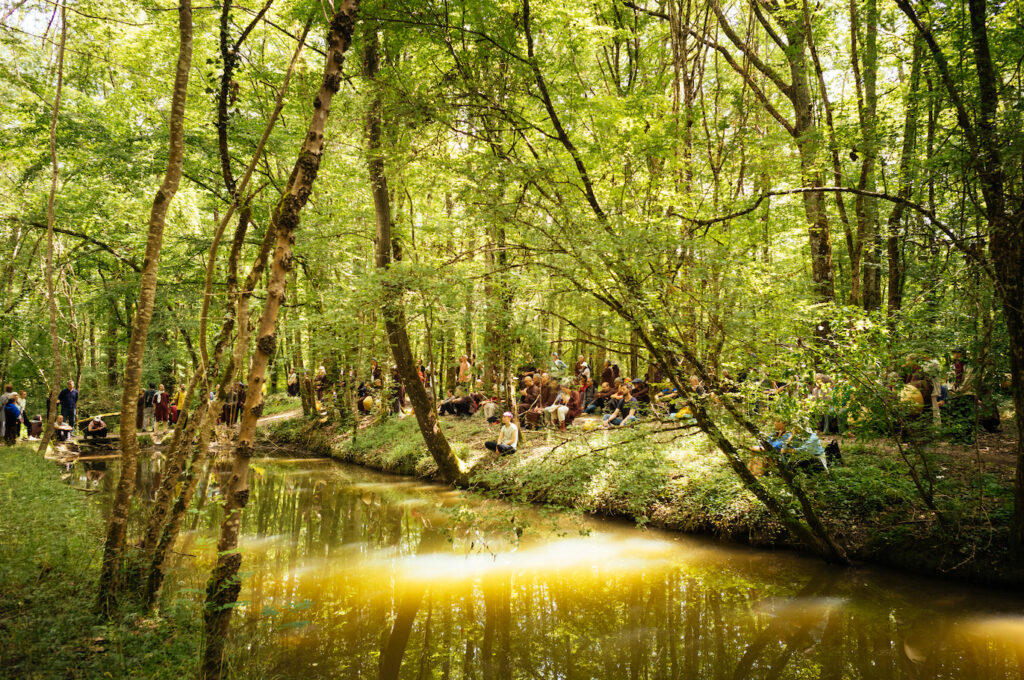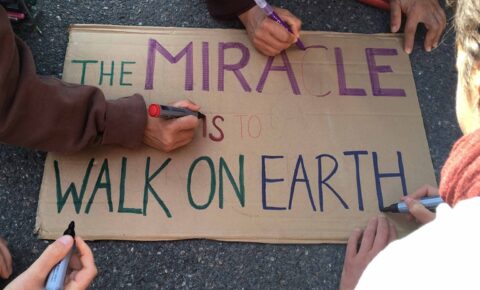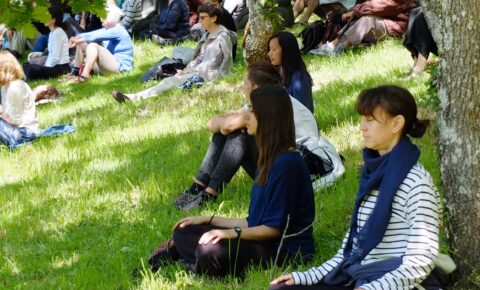On October 18th 2024 Dharma teacher Kaira Jewel Lingo joined Brother Phap Luu (Brother Stream) in Deer Park Monastery to share how we can practice mindfulness in divisive times. This offering is part of a monthly online series on Engaged Buddhism.
Awareness of the polycrisis
Kaira Jewel Lingo: I think this election, which is our present moment concern, is also a metaphor of climate catastrophe and all of the extreme weather events we’re facing. All of these things need the same kind of attention. We are just entering a time where things are destabilized. Whoever wins the election, we’re still going to have that issue very much front and center. There will be more and more climate refugees, more and more people whose lives are upended by a lack of water, extreme heat fires, floods, so this both – finding inner practices that can support us – but I think more – being able to connect with other people – is really the key to survival through this ongoing period of turbulence.
Embodying the insight of inter-being in the choices we make
It is one of the reasons why we want to live in this center so that we have a way to ground daily. That’s much more of the focus of our lives, to be deeply grounded in spiritual practice, but also where we’re connected to the land, we’re growing food, we’re bringing other people into connection with the Earth. We’re building a community where we take care of each other. We’re actually seeding the kind of future that is viable, a simple living, very intentional, ecological way of being with the Earth in terms of the building, the architecture. For example, using solar power and as little energy as possible in terms of how you build. We want to live in a way that is in integrity with what we know to be our interconnection with the world and offer the possibility of touching that to people who come and practice.
We want to live in a way that is in integrity with what we know to be our interconnection with the world and offer the possibility of touching that to people who come and practice.
One of the things we can also see as a practice for these times is living more simply ourselves. How can we really put into practice now, whatever it is that’s going to help the whole of humanity, the whole of our planet make this work? It means we need to consume less. I know that’s not always so easy, but when you live in community you can live more simply or when you are on the land. I’m not saying everyone has to move into the countryside, but the question is, what can each of us do to move that along in our own daily lives?
I think a lot of it has to do with how we consume. We (the USA) are the greediest country on Earth in terms of using so many resources of the planet. We make so much of the pollution that other people really suffer from in other parts of the world – through no fault of their own. In addition to building community we also need to ask how we make lifestyle decisions that we believe in, because the way we live is how we will support this shift. Many people are doing this, for example, putting solar panels up, driving less polluting cars, eating lower on the food chain. All these things make a huge difference. Getting together with others so that those things become reinforced is really important.

Healing the root causes of over-consumption and division
Br. Stream: What you said about us being the greediest country on the earth – I often come back to this. Growing up in America I see two kinds of traumas that we have not really put our energy into healing: the enslavement of African peoples and the eradication of Indigenous peoples on this land. Because we haven’t healed or reconciled these traumas it manifests in this polarization we find ourselves in. All these things are knock on effects of that. Healing doesn’t happen quickly. Destruction can happen very quickly but healing takes a long time. It takes concerted effort. It is easiest in the moment just to eat, just to consume, because it takes so long to heal. How can we develop the patience to, as a collective body, starting with ourselves, be able to bring about that healing process?
I think of the ceremonies I did in 2007 in Vietnam and what kind of ceremonies we can do. How can we bring about that healing? Because we all love this land. Those of us who have ancestors who colonized this land, those of us who have ancestors who are Indigenous, those of us who have both, those of us who were brought to work, to build up this country, how do we heal? That’s a big question.
Kaira Jewel Lingo: This is such an important question. A lot happened for me in those healing ceremonies in Vietnam that took me exactly back to slavery, genocide of native peoples, witch hunts of women in the US. For those of you who might not have been there or know, Thay organized three mass requiem ceremonies three days long each. One in Hanoi, one in Saigon, and Hoi Ann City. About 10,000 people came to each of these ceremonies. It was the first time that Vietnamese people had a chance to mourn their dead that they had lost in the war. They were able to share the names of the people they had lost, where they died, and how they died. It was the first public acknowledgment and a chance to really express grief. A Tantric Master held these ceremonies along with Thay and his students were chanting. We were joining the chants. We would just go into the Buddha Hall and chant all night long. We would be there, they would be chanting, but we would just be sending energy, holding this space.
All these kind of very profound things happened that are kind of unexplainable, like some supernatural things where it was somehow clear that the spirits or the energies of these people were, well, something was happening for all of us. One of the things that Thay was saying to people who were following along from home was for everyone to practice The Five Mindfulness Trainings for these three days at least. To speak lovingly to people in your family, live in a wholesome way during these three days to make this healing of the collective possible. I think that’s another thing we can take from that experience in this election time and any time of strife and difficulty, is to really think about how we can purify. Eat in a way that is purifying, speak in a way that’s purifying, act with our body, with our speech with our thoughts in ways that are purifying so that we can be as prepared and ready as we can be to serve and to be channels for the healing to come through
Eat in a way that is purifying, speak in a way that’s purifying, act with our body, with our speech with our thoughts in ways that are purifying so that we can be as prepared and ready as we can be to serve and to be channels for the healing to come through.
When I was in these sessions of chanting I remember going into a very deep place of feeling connected to the ancestors of the Americas and really recognizing how what we were doing there – in those ceremonies to address the suffering of the war – felt very connected to me. All the suffering of slavery, native genocide, witch hunts – that just came up as a realization, that this can be healed here too. There was so much spiritual energy collecting that it evoked that in me, of what I carry, what we all carry – this trauma from our shared history. I found myself saying prayers for all of the victims of those holocausts. It made me think – how can we do these mass requiem ceremonies of healing in the US?
I know there’s a Japanese Buddhist group that has done pilgrimages to all the places on the coast where slave ships were brought and where slave markets were and even to trees where lynchings happened. Then there’s rituals they’ve done. There’s prayers, there’s the beautiful Museum in Montgomery that honors those who’ve been lynched throughout the country. Over 3,600 lynchings. There’s a monument with the name of each of those people and the dates when they were lynched so I think there are ways to massage those knots in the collective consciousness through ceremony and I’ve often thought it would be lovely to think about how to do that kind of ceremony here.





